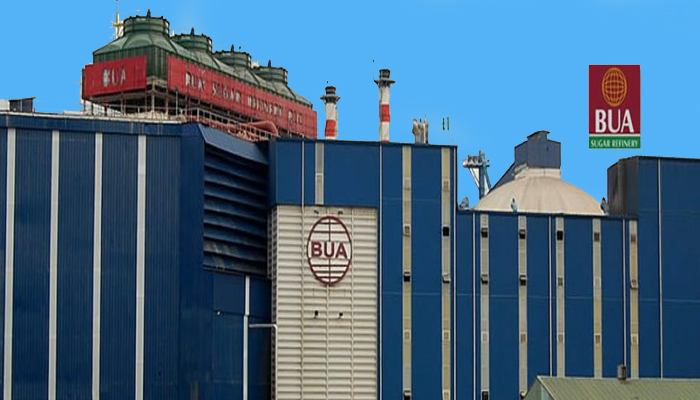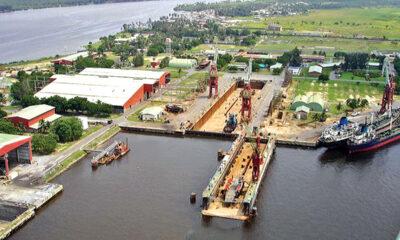- BUA Group to Defend Rights Against Decommissioning of Port Harcourt Terminal
BUA Group, the leading infrastructure giant and the legal owner of BUA Ports and Terminal, Port Harcourt, before it was decommissioned by the Nigeria Ports Authority (NPA), has said it will defend and protect its rights against NPA action.
In a statement released by NPA, the agency had accused the management of Port Harcourt Terminal of operating in an unsafe operational environment, saying BUA Jetty needs urgent repairs and reconstruction, therefore, the decommissioning.
BUA Group, however, refuted the statement saying it had written to NPA on numerous occasions, seeking approval to perform the necessary repairs and reconstruction but NPA had refused all applications, yet went ahead to decommission the jetty for the same reason it refused approval.
The company also accused NPA of failing to meet lease agreement and blatantly disregarding the Federal High Court, Lagos Division restraining NPA from terminating lease agreement pending when the court will preside over the ongoing dispute in accordance with the lease agreement.
According to stakeholders, this move could undermine NPA concession agreements and discourage real investors from investing in the maritime sector.
Despite the challenges, BUA Group said it remains unshaken by NPA intimidation and vowed to vigorously defend its rights as provided under the signed agreement in court, the BUA stated in a statement released on Sunday.
The statement reads, “Our attention has been drawn to recent publications and news report in various news media and inundated with calls from various media houses and stakeholders asking for our side of the issues with the management of Nigerian Ports Authority [NPA] over the decommissioning of our Terminal at Port Harcourt. Ordinarily, we would not have reacted to such publication as the matter is currently before the competent court and subject of arbitration proceeding between the parties. However, it is important that we present salient facts in similar medium of the publication for the benefit of the stakeholders in the maritime industry and the general public.
“Under the agreement between the parties, NPA has an obligation, among others, to dredge the port and repair the quay apron of the Terminal which responsibility it has failed to perform till date.
“The background to the issues between the NPA and BUA Ports and Terminals Limited has its root in the Lease Agreement between the Nigerian Port Authority, the Bureau of Public Enterprises on one hand both representing the Federal Government of Nigeria and BUA Ports and Terminal Limited on the other hand. The Lease Agreement provides for mutual rights and obligations and makes provision for dispute resolution mechanism which explicitly states that dispute shall be resolved by arbitration.
“To our surprise and utter bewilderment and in clear breach of the contractual provisions , NPA by a letter dated 11th November, 2016 terminated the Lease Agreement. BUA Ports and Terminals as a law abiding corporate citizen approached the Federal High Court, Lagos Division in Suit No. FHC/L/CS/633/17 between BUA Ports and Terminal Ltd v. NPA contesting the purported termination of the Lease and obtained an order of injunction restraining NPA from terminating or giving effect to the Notice of Termination pending the referral of the issues in dispute to arbitration as provided under the Agreement. The Order granting injunction is dated 18th January, 2018.
“By the terms of the Agreement, the parties are enjoined to continue with the observance of the terms and performance of their respective obligations under the Agreement even while disputes are being resolved by either court or arbitration.
“As a result of the injunction and the terms of the contract, BUA Ports and Terminals continues to carry out its obligations under the contract pending the resolution of the dispute. It is important to state that subsequent to the order of injunction, BUA Ports and Terminals wrote several letters and made overtures to the management of NPA for an amicable resolution of the dispute. NPA did not respond to the request for amicable settlement or the overtures made as the management of NPA appears bent and determined to give effect to the Notice of Termination by several measures including but not limited to decommissioning the Terminal.
“Consistent with the terms of the agreement, BUA wrote a letter dated 16th May, 2019 to notify the NPA of the state of the jetty and the need for immediate remedial works. BUA Ports and Terminals specifically in that letter requested the approval of NPA for it to carry out the necessary repairs and reconstruction to avert imminent collapse and danger to human lives. However, NPA instead of giving the requisite approval as requested in our letter and consistent with the terms of the Agreement, in its determination to give effect to the purported Notice of Termination took laws into its hand by directing the decommissioning of the jetty and immediate closure of the Terminal.
“It should be stated that the repairs required was as a result of the nefarious activities of hoodlums and vandals who had over a period of time cut the pipes and steel beam of the berths thereby affecting their stability, among others. The activities of these hoodlums and vandals were at various times reported to the NPA who had the responsibility and obligation under the Agreement to provide security for the Ports. The NPA did nothing. Indeed, BUA in its determined effort to tackle these issues caused some arrests to be made and some of the suspects prosecuted, but NPA as owners of the Ports showed little or no interest in the prosecution and the case was lost. Obviously if the NPA had been alive to its responsibilities and provided the required security, the activities of the vandals would have been prevented.
“It is important to stress that the repair and reconstruction required for the part of the Jetty in question does not require a decommissioning or closure of the entire Terminal. The carrying out of the remedial works if approved by the management of NPA would have remedied the defects stated in our letter to NPA and averted any risk of loss of property and lives. It is apparent that NPA is using the said letter by BUA Ports and Terminals as a subterfuge for an effective termination and closure of the Terminal in violation of the order of the court restraining NPA from carrying into effect the purported Notice of Termination.”


 Forex2 weeks ago
Forex2 weeks ago


 Naira2 weeks ago
Naira2 weeks ago
 Billionaire Watch1 week ago
Billionaire Watch1 week ago
 Company News4 weeks ago
Company News4 weeks ago




 Naira2 weeks ago
Naira2 weeks ago




 Naira1 week ago
Naira1 week ago




 Naira4 weeks ago
Naira4 weeks ago
 Nigerian Exchange Limited4 weeks ago
Nigerian Exchange Limited4 weeks ago





















